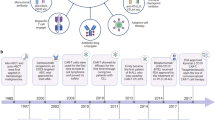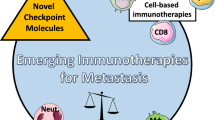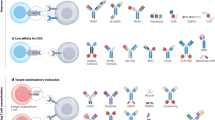Abstract
Studies of the administration of interleukin-2 to patients with metastatic melanoma or kidney cancer have shown that immunological manipulations can mediate the durable regression of metastatic cancer. The molecular identification of cancer antigens has opened new possibilities for the development of effective immunotherapies for patients with cancer. Clinical studies using immunization with peptides derived from cancer antigens have shown that high levels of lymphocytes with anti-tumour activity can be raised in cancer-bearing patients. Highly avid anti-tumour lymphocytes can be isolated from immunized patients and grown in vitro for use in cell-transfer therapies. Current studies are aimed at understanding the mechanisms that enable the cancer to escape from immune attack.
This is a preview of subscription content, access via your institution
Access options
Subscribe to this journal
Receive 51 print issues and online access
$199.00 per year
only $3.90 per issue
Buy this article
- Purchase on Springer Link
- Instant access to full article PDF
Prices may be subject to local taxes which are calculated during checkout

Similar content being viewed by others
References
Hewitt, H. B., Blake, E. R. & Walder, A. S. A critique of the evidence for active host defence against cancer, based on personal studies of 27 murine tumours of spontaneous origin. Br. J. Cancer 33, 241(1976).
Woglom, W. H. Immunity to transplantable tumors. Cancer Res. 4, 129(1929).
Rosenberg, S. A. (ed.) Principles and Practice of the Biologic Therapy of Cancer (Lippincott, Philadelphia, 2000).
Rosenberg, S. A. et al. Observations on the systemic administration of autologous lymphokine-activated killer cells and recombinant interleukin-2 to patients with metastatic cancer. N. Engl. J. Med. 313, 1485–1492 (1985).
Rosenberg, S. A., Yang, J. C., White, D. E. & Steinberg, S. M. Durability of complete responses in patients with metastatic cancer treated with high-dose interleukin-2. Ann. Surg. 228, 307–319 (1998).
Fyfe, G. et al. Results of treatment of 255 patients with metastatic renal cell carcinoma who received high dose proleukin interleukin-2 therapy. J. Clin. Oncol. 13, 688–696 (1995).
Atkins, M. B. et al. High-dose recombinant interleukin-2 therapy for patients with metastatic melanoma: analysis of 270 patients treated between 1985 and 1993. J. Clin. Oncol. 17, 2105–2116 (1999).
Rosenberg, S. A. A new era for cancer immunotherapy based on the genes that encode cancer antigens. Immunity 10, 281–287 (1999).
Boon, T., Coulie, P. G. & Van den Eynde B. Tumor antigens recognized by T cells. Immunol. Today 18, 267–268 (1997).
Hunt, D. F. et al. Characterization of peptides bound to the Class I MHC molecule HLA-A2.1 by mass spectrometry. Science 255, 1261–1263 (1992).
Cox, A. L. et al. Identification of a peptide recognized by five melanoma-specific human cytotoxic T cell lines. Science 264, 716–719 (1994).
Kawashima, I., Hudson, S. J. & Tsai, V. The multi-epitope approach for immunotherapy for cancer: identification of several CTL epitopes from various tumor-associated antigens expressed on solid epithelial tumors. Hum. Immunol. 59, 1–14 (1989).
Chen, Y. T., Scanlan, M. J. & Sahin, U. A testicular antigen aberrantly expressed in human cancers detected by autologous antibody screening. Proc. Natl Acad. Sci. USA 94, 1914–1918 (1997).
Wang, R. -F., Wang, X., Atwood, A. L., Topalian, S. L. & Rosenberg, S. A. Cloning genes encoding MHC class II-restricted antigens: mutated CDC27 as a tumor antigen. Science 284, 1351–1354 (1999).
Lowy, D. R. & Schiller, J. T. in Cancer Principles & Practice of Oncology 6th edn (eds DeVita, V. T., Hellman, S. & Rosenberg, S. A.) 3189–3195 (Lippincott, Philadelphia, 2001).
Stoler, D. L. et al. The onset and extend of genomic instability in sporadic colorectal tumor progression. Proc. Natl Acad. Sci. USA 26, 15121–15126 (1999).
Landsteiner, K. & Chase, M. W. Experiments on transfer of cutaneous sensitivity to simple compounds. Proc. Soc. Exp. Biol. Med. 49, 688 (1942).
Klein, E. & Sjogren, H. O. Humoral and cellular factors in homograft and isograft immunity. Cancer Res. 20, 452 (1960).
Old, L. J., Boyse, E. A. & Clarke, D. A. Antigenic properties of chemically induced tumors. Ann. NY Acad. Sci. 101, 80 (1962).
Rosenberg, S. A. et al. A progress report on the treatment of 157 patients with advanced cancer using lymphokine activated killer cells and interleukin-2 or high dose interleukin-2 alone. N. Engl. J. Med. 316, 889–897 (1987).
Muul, L. M., Spiess, P. J., Director, E. P. & Rosenberg, S. A. Identification of specific cytolytic immune responses against autologous tumor in humans bearing malignant melanoma. J. Immunol. 138, 989–995 (1987).
Itoh, K., Platsoucas, D. C. & Balch, C. M. Autologous tumor-specific cytotoxic T lymphocytes in the infiltrate of human metastatic melanomas: activation by interleukin 2 and autologous tumor cells and involvement of the T cell receptor. J. Exp. Med. 168, 1419–1441 (1988).
Rosenberg, S. A. et al. Use of tumor infiltrating lymphocytes and interleukin-2 in the immunotherapy of patients with metastatic melanoma. Preliminary report. N. Engl. J. Med. 319, 1676–1680 (1988).
Rosenberg, S. A. et al. Treatment of patients with metastatic melanoma using autologous tumor-infiltrating lymphocytes and interleukin-2. J. Natl Cancer Inst. 86, 1159–1166 (1994).
Papadopoulos, E. B. et al. Infusions of donor leukocytes to treat Epstein-Barr virus-associated lymphoproliferative disorders after allogeneic bone marrow transplantation. N. Engl. J. Med. 17, 1185–1191 (1994).
Rosenberg, S. A. et al. Immunologic and therapeutic evaluation of a synthetic tumor associated peptide vaccine for the treatment of patients with metastatic melanoma. Nature Med. 4, 321–327 (1998).
Walter, E. A. et al. Reconstitution of cellular immunity against cytomegalovirus in recipients of allogeneic bone marrow by transfer of T-cell clones from the donor. N. Engl. J. Med. 333, 1038–1044 (1995).
Yee, C., Gilbert, M. J. & Riddell, S. R. Isolation of tyrosinase-specific CD8+ and CD4+ T cell clones from the peripheral blood of melanoma patients following in vitro stimulation with recombinant vaccinia virus. J. Immunol. 157, 4079–4086 (1996).
Dudley, M. E., Ngo, L. T., Westwood, J., Wunderlich, J. R. & Rosenberg, S. A. T cell clones from melanoma patients immunized against an anchor-modified gp100 peptide display discordant effector phenotypes. Cancer J. Sci. Am. 6, 69–77 (2000).
Rosenberg, S. A. Gene therapy for cancer. J. Am. Med. Assoc. 268, 2416–2419 (1992).
Rosenberg, S. A. et al. Immunizing patients with metastatic melanoma using recombinant adenoviruses encoding MART-1 or gp100 melanoma antigens. J. Natl Cancer. Inst. 90, 1894–1900 (1998).
Marshall, J. L. et al. Phase I study in advanced cancer patients of a diversified prime-and-boost vaccination protocol using recombinant vaccinia virus and recombinant nonreplicating avipox virus to elicit anti-carcinoembryonic antigen immune responses. J. Clin. Oncol. 23, 3963–3973 (2000).
Eder, J. P. et al. A phase I trial of a recombinant vaccinia virus expressing prostate-specific antigen in advanced prostate cancer. Clin. Cancer Res. 5, 1632–1638 (2000).
Marshall, J. L. et al. Phase I study in cancer patients of a replication-defective avipox recombinant vaccine that expresses human carcinoembryonic antigen. J. Clin. Oncol. 17, 332–337 (1999).
Restifo, N. P., Ying, H., Hwang, L. & Leitner, W. W. The promise of nucleic acid vaccines. Gene Ther. 2, 89–92 (2000).
Wang, R. et al. Induction of antigen-specific cytotoxic T lymphocytes in humans by a malaria DNA vaccine. Science 282, 476–480 (1998).
Dallal, R. M., Mailliard, R. & Lotze, M. T. in Principles and Practice of the Biologic Therapy of Cancer 3rd edn (ed. Rosenberg, S. A.) 705–721 (Lippincott, Philadelphia, 2000).
Gong, J. et al. Fusions of human ovarian carcinoma cells with autologous or allogeneic dendritic cells induce antitumor immunity. J. Immunol. 3, 1705–1711 (2000).
Parkhurst, M. R. et al. Improved induction of melanoma reactive CTL with peptides from the melanoma antigen gp100 modified at HLA-A* 0210 binding residues. J. Immunol. 157, 2539–2548 (1996).
Rosenberg, S. A. et al. Impact of cytokine administration on the generation of antitumor reactivity in patients with metastatic melanoma receiving a peptide vaccine. J. Immunol. 163, 1690–1695 (1999).
Marincola, F. M. in Principles and Practice of the Biologic Therapy of Cancer 3rd edn (ed. Rosenberg, S. A.) 601–617 (Lippincott, Philadelphia, 2000).
Kawakami, Y. et al. Cloning of the gene coding for a shared human melanoma antigen recognized by autologous T cells infiltrating into tumor. Proc. Natl Acad. Sci. USA 91, 3515–3519 (1994).
Kawakami, Y. et al. Identification of a human melanoma antigen recognized by tumor infiltrating lymphocytes associated with in vivo tumor rejection. Proc. Natl Acad. Sci. USA 91, 6458–6462 (1994).
Brichard, V. et al. The tyrosinase gene codes for an antigen recognized by autologous cytolytic T lymphocytes on HLA-A2 melanomas. J. Exp. Med. 178, 489–495 (1993).
Wang, R. F., Robbins, P. F., Kawakami, Y., Kang, X. Q. & Rosenberg, S. A. Identification of a gene encoding a melanoma tumor antigen recognized by HLA-A31-restricted tumor-infiltrating lymphocytes. J. Exp. Med. 181, 799–804 (1995).
Wang, R. -F., Appella, E., Kawakami, Y., Kang, X. & Rosenberg, S. A. Identification of TRP-2 as a human tumor antigen recognized by cytotoxic T lymphocytes. J. Exp. Med. 184, 2207–2216 (1996).
Salazar-Onfray, F. et al. Synthetic peptides derived from the melanocyte-stimulating hormone receptor MC1R can stimulate HLA-A2-restricted cytotoxic T lymphocytes that recognize naturally processed peptides on human melanoma cells. Cancer Res. 57, 4348–4355 (1997).
Van der Bruggen, P. et al. A gene encoding an antigen recognized by cytolytic T lymphocytes on a human melanoma. Science 254, 1643–1647 (1991).
Visseren, M. J. et al. Identification of HLA-A*0201-restricted CTL epitopes encoded by the tumor-specific MAGE-2 gene product. Int. J. Cancer 73, 125–130 (1997).
Gaugler, B. et al. Human gene MAGE-3 codes for an antigen recognized on a melanoma by autologous cytolytic T lymphocytes. J. Exp. Med. 179, 921–930 (1994).
Panelli, M. C. et al. A tumor-infiltrating lymphocyte from a melanoma metastasis with decreased expression of melanoma differentiation antigens recognizes MAGE-12. J. Immunol. 4382–4392 (2000).
Boel, P. et al. BAGE: a new gene encoding an antigen recognized on human melanomas by cytolytic T lymphocytes. Immunity 2, 167–175 (1995).
Van Den Eynde, B. et al. A new family of genes coding for an antigen recognized by autologous cytolytic T lymphocytes on a human melanoma. J. Exp. Med. 182, 689–698 (1995).
Jager, E., Chen, Y. T. & Drijfhout, J. W. Simultaneous humoral and cellular immune response against cancer-testis antigen NY-ESO-1: definition of human histocompatibility leukocyte antigen (HLA)-A2-binding peptide epitopes. J. Exp. Med. 187, 265–270 (1998).
Wang, R. -F. et al. A breast and melanoma-shared tumor antigenic peptides translated from different open reading frames. J. Immunol. 161, 3596–3606 (1998).
Robbins, P. F. et al. A mutated B-catenin gene encodes a melanoma-specific antigen recognized by tumor infiltrating lymphocytes. J. Exp. Med. 183, 1185–1192 (1996).
Chiari, R. et al. Two antigens recognized by autologous cytolytic T lymphocytes on a melanoma result from a single point mutation in an essential housekeeping gene. Cancer Res. 22, 5785–5792 (1999).
Wolfel, T. et al. A p16INK4A-insensitive CDK4 mutant targeted by cytolytic T lymphocytes in a human melanoma. Science 269, 1281–1284 (1995).
Mandruzzato, S., Brasseur, F. & Andry, G. A CASP-8 mutation recognized by cytolytic T lymphocytes on a human head and neck carcinoma. J. Exp. Med. 186, 785–793 (1997).
Gueguen, M., Matard, J. J. & Gaugler, B. An antigen recognized by autologous CTLs on a human bladder carcinoma. J. Immunol. 160, 6188–6194 (1998).
Brandle, D., Brasseur, F. & Weynants, P. A mutated HLA-A2 molecule recognized by autologous cytotoxic T lymphocytes on a human renal cell carcinoma. J. Exp. Med. 183, 2501–2508 (1996).
Butterfield, L. H. et al. Generation of human T-cell responses to an HLA-A2.1-restricted peptide epitope derived from alpha-fetoprotein. Cancer Res. 59, 3134–3142 (1999).
Vonderheide, R. H., Hahn, W. C., Schultze, J. L. & Nadler, L. M. The telomerase catalytic subunit is a widely expressed tumor-associated antigen recognized by cytotoxic T lymphocytes. Immunity 10, 673–679 (1999).
Vissers, J. L. et al. The renal cell carcinoma-associated antigen G250 encodes a human leukocyte antigen (HLA)-A2.1-restricted epitope recognized by cytotoxic T lymphocytes. Cancer Res. 59, 5554–5559 (1999).
Jerome, K. R. et al. Cytotoxic T-lymphocytes derived from patients with breast adenocarcinoma recognize an epitope present on the protein core of a mucin molecule preferentially expressed by malignant cells. Cancer Res. 51, 2908–2916 (1991).
Tsang, K. Y., Zaremba, S. & Nieroda, C. A. Generation of human cytotoxic T cells specific for human carcinoembryonic antigen epitopes from patients immunized with recombinant vaccinia-CEA vaccine. J. Natl Cancer Inst. 87, 982–990 (1995).
Theobald, M. B. J., Dittmer, D., Levine, A. J. & Sherman, L. A. Targeting p53 as a general tumor antigen. Proc. Natl Acad. Sci. USA 92, 11993–11997 (1995).
Ioannides, C. G. et al. T cells isolated from ovarian malignant ascites recognize a peptide derived from the HER-2/neu proto-oncogene. Cell Immunol. 151, 225–234 (1993).
Li, K. et al. Tumour-specific MHC-class-II-restricted responses after in vitro sensitization to synthetic peptides corresponding to gp100 and annexin II eluted from melanoma cells. Cancer Immunol. Immunother. 47, 32–38 (1998).
Chaux, P. et al. Identification of MAGE-3, epitopes presented by HLA-DR molecules to CD4+ T lymphocytes. J. Exp. Med. 189, 767–777 (1999).
Topalian, S. L. et al. Human CD4+ T cells specifically recognize a shared melanoma-associated antigen encoded by the tyrosinase gene. Proc. Natl Acad. Sci. USA 91, 9461–9465 (1994).
Zeng, G. et al. Identification of CD4+ T cell epitopes from NY-ESO-1 presented by HLA-DR molecules. J. Immunol. 165, 1153–1159 (2000).
Pieper, R. et al. Biochemical identification of a mutated human melanoma antigen recognized by CD4+ T cells. J. Exp. Med. 189, 757–766 (1999).
Wang, R. -F., Wang, X. & Rosenberg, S. A. Identification of a novel major histocompatibility complex class II-restricted tumor antigen resulting from a chromosomal rearrangement recognized by CD4+ T cells. J. Exp. Med. 189, 1659–1667 (1999).
Author information
Authors and Affiliations
Rights and permissions
About this article
Cite this article
Rosenberg, S. Progress in human tumour immunology and immunotherapy. Nature 411, 380–384 (2001). https://doi.org/10.1038/35077246
Published:
Issue Date:
DOI: https://doi.org/10.1038/35077246
This article is cited by
-
Combined score based on plasma fibrinogen and platelet-lymphocyte ratio as a prognostic biomarker in esophageal squamous cell carcinoma
BMC Cancer (2024)
-
Reporting perioperative complications of radical cystectomy: the influence of using standard methodology based on ICARUS and EAU quality criteria
World Journal of Surgical Oncology (2023)
-
Preoperative sarcopenia combined with prognostic nutritional index predicts long-term prognosis of radical gastrectomy with advanced gastric cancer: a comprehensive analysis of two-center study
BMC Cancer (2023)
-
A novel CTLA-4 blocking strategy based on nanobody enhances the activity of dendritic cell vaccine-stimulated antitumor cytotoxic T lymphocytes
Cell Death & Disease (2023)
-
Chemotherapy following immune checkpoint inhibitors in recurrent or metastatic head and neck squamous cell carcinoma: clinical effectiveness and influence of inflammatory and nutritional factors
Discover Oncology (2023)
Comments
By submitting a comment you agree to abide by our Terms and Community Guidelines. If you find something abusive or that does not comply with our terms or guidelines please flag it as inappropriate.



